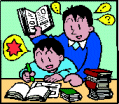Back to School
Problem
![]()
Mr. Sunshine tells the children they will have 2 hours of homework each evening every school day in the year.
![]()
Harry, who has a horror of homework, hauls out his homework diary. The school calendar shows 180 school days this year.

He wants to calculate how many full days of homework he will have.
Can you help Harry figure out the number of days?
Hmmm...Harry thinks he has too much work to do and goes to his teacher. "What else do you do with your time?" asks Mr Sunshine. Harry makes a list.
"This is not a leap year", Harry reminded himself as he begins his task. I go to school for 7 hours a day, though it seems much longer! My mother says everybody must have 8 hours of sleep each night, and I do. As he has a snack, his estimates that he spends 2 hours a day eating.
Harry stops and gets a calculator to help him discover just how he spends his time. He realises that he needs to round off his answers to the nearest day.

How much time does Harry spend on school, snoozing and snacking?
Not content with the time he has already accounted for, Harry carries on counting.
"Well, weekends are taken up with sports and visiting. I'm way too busy for homework," he thinks. He adds in all of the weekend days to his growing list.

"I could do with a holiday after all this work", he thinks. Ahh, holidays. Harry looks at the calendar again, he has counted weekends so that leaves 11 weeks of weekdays for holidays.
A few jottings and calculator keys later, Harry realises he can't possibly do 15 days of homework this year.
Is Harry correct?
Mr Sunshine checks Harrys calculations, they seem to be right. He thought about it and said, "We need to spend some time trying and explain what's happened here, Harry."

What can you say about Harry's reasoning ?
Student Solutions
Teachers' Resources
Why do this problem?
Possible approach
You could introduce the problem in the form of a story, perhaps by projecting it, a paragraph at a time. Having read everything through once, invite children to chat in pairs about what they might do. Take some suggestions and then perhaps read everything through again.Allow children plenty of time to work in pairs, bringing the together to share important ideas at suitable intervals, if appopriate (a mini-plenary).
In the plenary, you could choose a few pairs to explain their thinking to everyone.
Key questions
What does this tell you?
